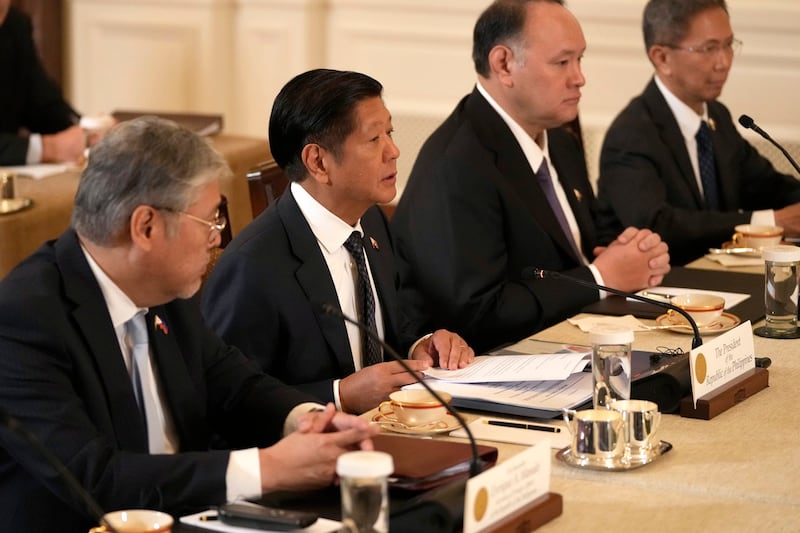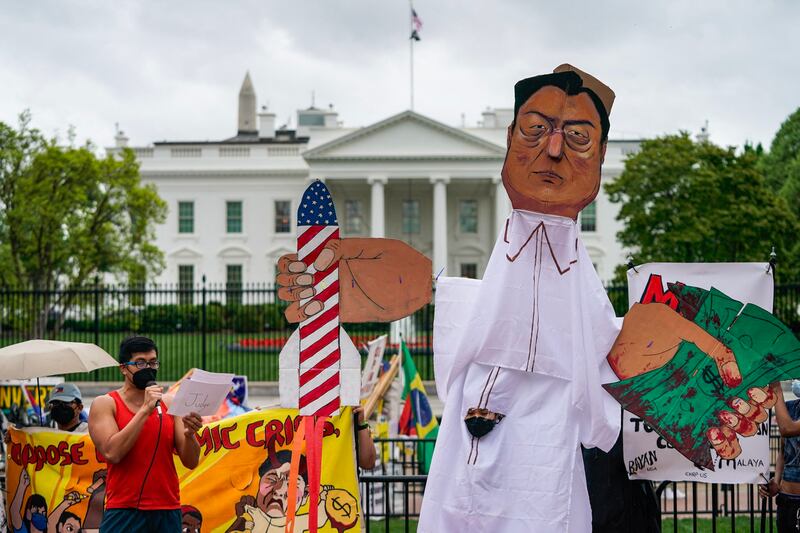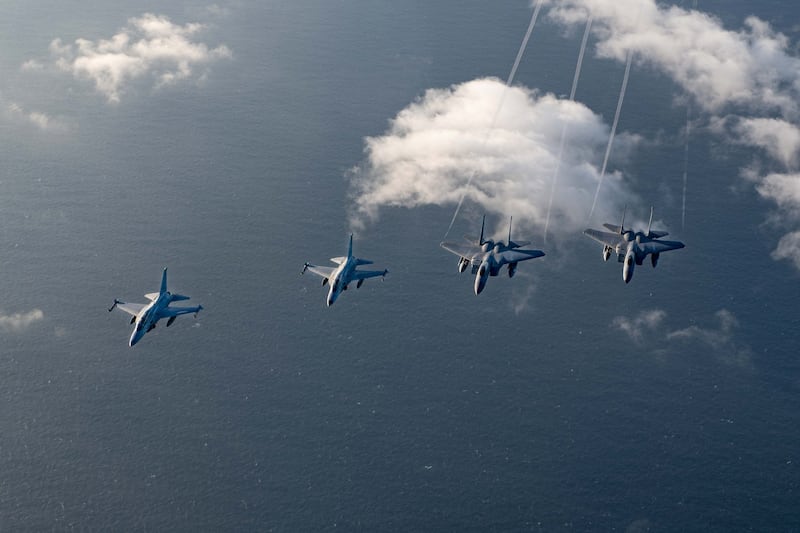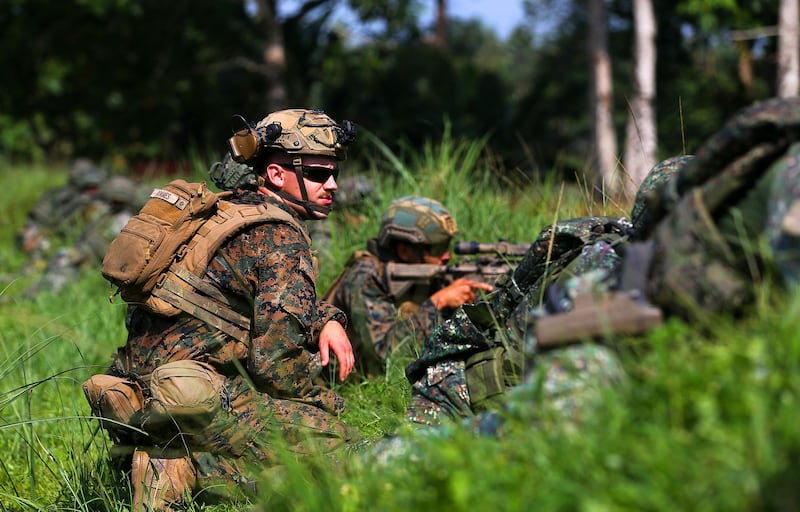The Philippines stands to reap an economic windfall through a new security partnership with the U.S. and Japan that their leaders unveiled at a Washington summit Thursday, in seeking to dull the edge of China’s influence in the Asia-Pacific.
U.S. President Joe Biden hosted Philippine and Japanese leaders Ferdinand Marcos Jr. and Fumio Kishida at the White House in what was billed as an inaugural tripartite summit. It came on the heels of surging Chinese assertiveness in the disputed South China Sea.
As part of a joint statement outlining their collective vision for regional security, the three leaders announced plans for collaborating on economic projects in the Philippines, including developing an infrastructure and high-tech connectivity corridor on the main island of Luzon.
The three allies were careful to describe their new partnership as a defense cooperation pact in nature.
“We meet today as friends and partners, bound by a shared vision and pursuit of a peaceful, stable and prosperous Indo-Pacific,” President Marcos said.
“It is a partnership, borne not out of convenience nor of expediency, but as a natural progression of a deepening relations and robust cooperation amongst our three nations, linked by a profound respect for democracy, good governance, and the rule of law.”

Marcos, the namesake son of the late Philippine dictator Ferdinand E. Marcos, has steered his country back to close relations with the United States, its traditional ally, after those ties had cooled under his predecessor, who drew the Philippines closer to China.
Marcos said the summit was the culmination of cooperation by the three nations that had started even before the historic one-day meeting took place.
Security officials of the three nations already had been meeting to lay the foundation for “trilateral maritime exercises,” and the expansion of annual large-scale maritime exercises between the U.S. and the Philippines, he said.
The trilateral meeting, Marcos said, would likely evolve in the future, as the three partners all face increasingly complex challenges that require “an unwavering commitment to the rules-based international order.”
That was an indirect reference to China. The three allies have often accused Beijing of ignoring international rules as it moves to expand its reach in the region.
More directly, the joint statement expressed the three nations’ steadfast opposition to “the dangerous and coercive use” by China of its coast guard and maritime militia ships in the South China Sea “as well as efforts to disrupt other countries’ offshore resource exploration.”
“We reiterate serious concern over [China’s] repeated obstruction of Philippine vessels’ exercise of high seas freedom of navigation and the disruption of supply lines to Second Thomas Shoal,” it said, referring to a reef also known as Ayungin Shoal, which lies in South China Sea waters within the Philippines’ exclusive economic zone.
Japan, for its part, is locked in a territorial dispute with China in the East China Sea.
In their statement, the leaders reiterated their “strong opposition to any attempts by the PRC [People’s Republic of China] to unilaterally change the status quo by force or coercion in the East China Sea.”
This includes “actions that seek to undermine Japan’s longstanding and peaceful administration of the Senkaku Islands.”
On Taiwan, which Beijing considers a renegade province, the leaders meanwhile affirmed the importance of peace and stability across the Taiwan Strait.
“This is a meeting that looks ahead. As we deepen our ties and enhance our coordination, we seek to identify ways of growing our economies and making them more resilient, climate-proofing our cities and our societies, sustaining our development progress, and forging a peaceful world for the next generation,” Marcos said.

Marcos’ father was a staunch ally of the United States, which during the Cold War operated huge naval and air bases in areas where the hi-tech Luzon corridor is to be installed.
Last year, Marcos Jr.'s administration agreed to a controversial deal with Washington to grant the U.S. military greater access on a rotational basis to bases in the northern Philippines.
The agreement has angered anti-war activists in the Philippines, who warn it could provoke Beijing and that their country could be caught in the middle of fighting should a conflict break out between the U.S. and China over Taiwan. On Thursday, protesters gathered near the White House as well as outside the U.S. Embassy in Manila to denounce the bilateral pact.
‘In lockstep’
On Thursday, Biden reiterated that his administration’s support for Manila was “ironclad” and that the two countries were bound by a mutual treaty to defend each other in times of foreign aggression. This decades-old pact was updated recently to cover civilian vessels, as well as ships from the Philippine Coast Guard.
“Any attack on Philippine aircraft, vessels or armed forces in the South China Sea would invoke our Mutual Defense Treaty,” Biden said in remarks at the White House.

On Friday, the national security advisers of the Philippines and the United States, together with their respective defense chiefs and top diplomats, took part in an unprecedented “3+3” meeting in Washington.
“Our alliance is stronger than ever,” U.S. Defense Secretary Lloyd Austin said before the meeting at the State Department. At the Pentagon, “we’re working in lockstep with our colleagues at the [Philippine] Department of National Defense to strengthen interoperability between our forces, to expand our operational coordination, and to stand up to coercion in the South China Sea.”
Last year, the two allies launched joint sea and air patrols in the contested waterway.

Meanwhile in Beijing, China’s foreign ministry criticized the summit in Washington as “bloc politics.”
"We firmly oppose any acts that stoke and drive up tensions and harm other countries' strategic security and interests," ministry spokeswoman Mao Ning said during a regularly scheduled news conference on Friday.
“We are seriously against forming exclusive groupings in this region. Japan and the Philippines have every right to develop normal relations with other countries, but they should not introduce bloc confrontation into this region,” she said.
Economic projects
During their meeting on Thursday, Marcos, Biden and Kishida also launched the “Luzon Corridor” – where they pledged to accelerate coordinated investments in high-impact projects including Subic Bay and Clark north of Manila.
Those were the sites of two of America’s largest overseas bases until a nationalist Philippine senate voted to end their lease in the early 1990s.
The corridor, they said, symbolized their “enhanced economic cooperation.”
“Japan, the Philippines and the United States are also partnering to expand cooperation and investments in other areas of the Philippines,” they said.
The U.S. State Department said that the Luzon Corridor was expected to have an “outsized impact” on critical industries, including semiconductors. As part of the plan, the U.S. government would seek to partner with multilateral development institutions as well as the private sector to deploy capital and spur economic activity across the corridor.
‘Windfall’
Defense analyst Chester Cabalza, the founding president of International Development and Security Cooperation, a Philippines think-tank, said both Washington and Tokyo were rewarding Manila for its principled stand on the South China Sea.
Cabalza said it couldn’t get any clearer than that, and the “windfall of economic pledges” was clearly a reward of sorts.
“These grew from the bravery of fighting for free and open trade in the Indo-Pacific and by supporting American and Japanese deterrence against a Chinese agenda of dominance in the contested waters,” Cabalza told BenarNews on Friday, noting that both industrialized nations had to “prepare against China’s increasing military might” including by way of forging alliances.
“This is an experimental forging of allegiance for a plausible shooting war in the region,” he said.
The analyst noted that the three-nation partnership could boost business confidence, and added that any country could counter China without fear of losing out from Beijing’s much-touted economic prowess.
The triumvirate has a combined gross domestic product output that “is far greater than China to counter China’s affluence and influence in Southeast Asia,” Cabalza said.
BenarNews is an RFA-affiliated online news organization.
